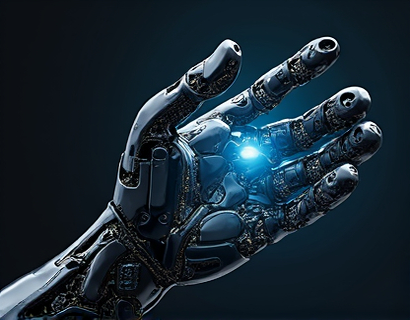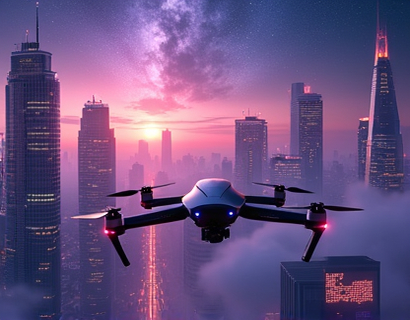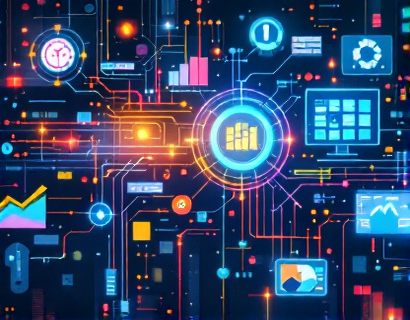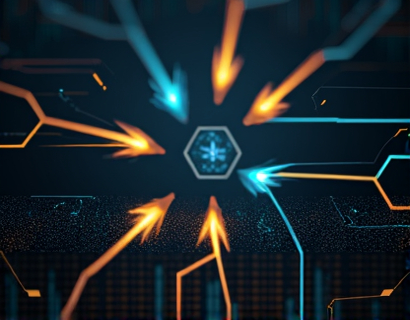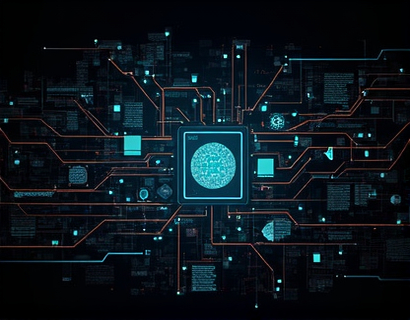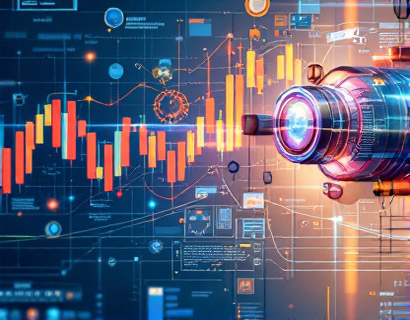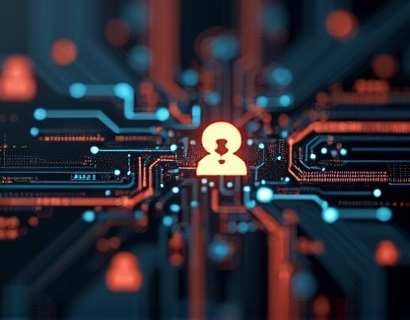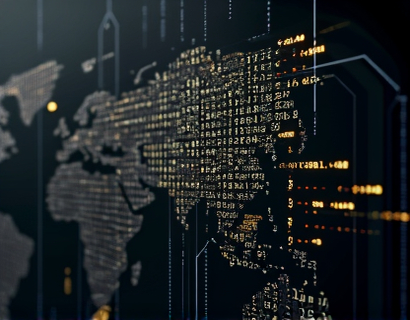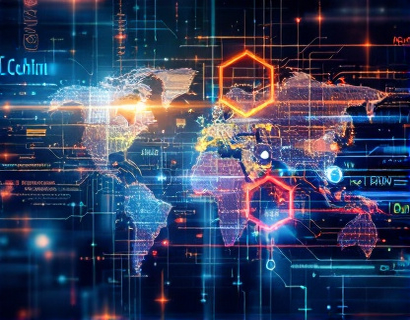The Synergy of AI and Crypto: Pioneering the Next Generation of Digital Transformation
The intersection of artificial intelligence and cryptocurrency is giving birth to a new era of digital transformation, one that promises to redefine user experiences and enhance connectivity across the global digital landscape. This fusion of technologies is not just an evolution but a revolution, offering unprecedented opportunities for innovation and engagement. As we delve into this topic, it's essential to understand the individual roles of AI and crypto before exploring their synergistic potential.
Understanding Artificial Intelligence in the Digital Realm
Artificial intelligence, or AI, refers to the simulation of human intelligence processes by machines, particularly computer systems. These processes include learning, reasoning, problem-solving, perception, and language understanding. In the digital world, AI has become a cornerstone for developing intelligent systems that can perform tasks that traditionally required human intervention. From virtual assistants to predictive analytics, AI is transforming how we interact with technology and how businesses operate.
The capabilities of AI are vast and continuously expanding. Machine learning, a subset of AI, enables systems to learn from data and improve over time without being explicitly programmed. This learning process involves algorithms that can adjust their parameters based on input data, making AI systems more accurate and efficient. Natural language processing (NLP) is another critical area where AI shines, allowing machines to understand, interpret, and generate human language, thereby facilitating more natural and intuitive interactions.
The Rise of Cryptocurrency and Blockchain Technology
Cryptocurrency, on the other hand, is a digital or virtual currency that uses cryptography for security. The most well-known cryptocurrency is Bitcoin, but there are thousands of others, each with unique features and use cases. Cryptocurrencies operate on blockchain technology, a decentralized ledger that records transactions across multiple computers in such a way that the registered transactions cannot be altered retroactively. This decentralization ensures transparency, security, and immutability, making blockchain a foundational technology for various applications beyond currency.
Blockchain's impact extends far beyond finance. It is being explored for supply chain management, healthcare records, voting systems, and more. The technology's ability to provide a secure and transparent way to conduct transactions and store data makes it a powerful tool for enhancing trust and efficiency in various industries.
AI and Crypto: A Perfect Match
The combination of AI and cryptocurrency is creating a powerful synergy that is driving the next wave of digital transformation. AI can enhance the functionality and security of blockchain-based systems, while blockchain can provide a robust and transparent environment for AI models to operate. Let's explore some of the key areas where this fusion is making a significant impact.
Enhanced Security and Fraud Detection
One of the most immediate benefits of integrating AI with cryptocurrency is the improvement in security and fraud detection. AI algorithms can analyze vast amounts of data in real-time to identify patterns and anomalies that may indicate fraudulent activity. This capability is crucial in the crypto space, where transactions are decentralized and often anonymous, making them vulnerable to various forms of fraud.
Machine learning models can be trained to recognize suspicious patterns and flag them for review. For instance, AI can detect unusual trading activities, such as sudden large transactions or patterns that deviate from normal behavior. This proactive approach to security can significantly reduce the risk of fraud and enhance the overall trust in cryptocurrency systems.
Optimized Trading and Investment Decisions
AI is also revolutionizing the way traders and investors interact with cryptocurrency markets. By leveraging AI-driven analytics, users can gain deeper insights into market trends, price movements, and potential investment opportunities. AI algorithms can process and analyze vast amounts of data from various sources, including social media, news feeds, and market data, to predict future price movements with a higher degree of accuracy.
Automated trading bots powered by AI can execute trades based on predefined strategies, allowing users to capitalize on market opportunities without constant monitoring. These bots can adapt to changing market conditions and learn from past trades to improve their performance over time. This level of automation and intelligence can level the playing field, making advanced trading strategies accessible to a broader audience.
Smart Contracts and Decentralized Applications
Smart contracts are self-executing contracts with the terms of the agreement directly written into code. They run on blockchain networks and automatically enforce and execute the terms of the contract when predefined conditions are met. AI can enhance smart contracts by adding layers of intelligence and adaptability.
For example, AI can be used to dynamically adjust the parameters of a smart contract based on real-time data, making the contract more responsive to changing conditions. This can be particularly useful in complex scenarios such as decentralized finance (DeFi) applications, where smart contracts manage a wide range of financial operations. AI can help optimize these operations, reduce risks, and improve user experiences.
Decentralized applications (dApps) built on blockchain platforms can also benefit from AI integration. AI can enhance the functionality of dApps by providing intelligent user interfaces, personalized recommendations, and predictive analytics. For instance, a decentralized lending platform can use AI to assess creditworthiness more accurately, offering better loan terms and reducing the risk of default.
User Experience and Interaction
The integration of AI and cryptocurrency is not only about backend processes but also about enhancing the user experience. AI-driven interfaces can make interacting with blockchain-based systems more intuitive and user-friendly. Natural language processing enables users to interact with smart contracts and dApps using natural language commands, reducing the learning curve and making these technologies more accessible to non-technical users.
Chatbots and virtual assistants powered by AI can provide 24/7 customer support, answering queries, guiding users through complex processes, and offering personalized assistance. This level of support can significantly improve user satisfaction and adoption rates, fostering a more inclusive and user-centric ecosystem.
Decentralized AI and Data Privacy
One of the critical advantages of combining AI with blockchain is the potential for decentralized AI systems. Traditional AI models often rely on centralized data repositories, raising concerns about data privacy and security. Blockchain can provide a decentralized and secure environment for AI models to train and operate, ensuring that data remains under the control of its owners.
Decentralized AI platforms can use blockchain to create marketplaces where data owners can monetize their data while maintaining privacy. AI models can be trained on this data without compromising individual privacy, as the data remains encrypted and only the model's output is shared. This approach not only enhances data security but also promotes a more equitable distribution of data benefits.
Challenges and Considerations
While the potential of AI and cryptocurrency integration is immense, there are several challenges and considerations that need to be addressed. One of the primary concerns is the computational power required for both AI training and blockchain operations. These processes are resource-intensive and can lead to significant energy consumption, raising environmental concerns.
Another challenge is the regulatory landscape. The crypto space is still navigating a complex web of regulations, and the integration of AI adds another layer of complexity. Ensuring compliance with existing laws while advocating for supportive regulations is crucial for the sustainable growth of this fusion technology.
Additionally, there is a need for standardization and interoperability. As the number of blockchain platforms and AI frameworks increases, ensuring that they can work together seamlessly is essential for widespread adoption. Collaboration among developers, regulators, and industry stakeholders is vital to overcome these challenges.
Future Prospects and Innovations
Looking ahead, the integration of AI and cryptocurrency is poised to drive further innovations and transformations. One exciting area is the development of AI-powered decentralized autonomous organizations (DAOs). DAOs are community-driven organizations governed by smart contracts, and AI can enhance their decision-making processes, resource allocation, and strategic planning.
Another promising direction is the use of AI in enhancing the scalability and efficiency of blockchain networks. Techniques such as sharding, where the blockchain is divided into smaller, more manageable parts, can be optimized using AI to improve transaction throughput and reduce latency. AI can also play a role in developing more energy-efficient consensus mechanisms, aligning with the growing emphasis on sustainability.
Moreover, the convergence of AI and cryptocurrency can lead to the creation of new economic models and value propositions. For instance, AI-driven tokenomics can dynamically adjust token supply and utility based on market conditions and user behavior, creating more resilient and adaptive economic systems.
Conclusion
The synergy between AI and cryptocurrency is not just a technological trend but a transformative force reshaping the digital landscape. By combining the intelligence of AI with the security and transparency of blockchain, we are witnessing the emergence of a new era of digital transformation. This fusion is enhancing security, optimizing operations, and creating more intuitive and user-friendly experiences. As we continue to explore and innovate at this intersection, the possibilities are endless, promising a future where technology serves humanity in more profound and meaningful ways.





